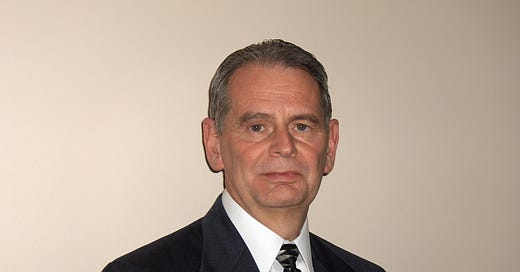By Richard Maye
Many circumstances will cross our path during the course of a person’s life and be they the good experiences or not so good, a pattern of your emotional resilience is formed early on. Some people seem to be able to withstand the strong winds that blow across their life, maintaining their balance. Others bend with the intensity of the wind of adversity and some break.
As a man diagnosed with prostate cancer you have had your emotional resilience, your anchor, tested by this strong wind along with those that are close to you and know about your condition.
During my career in the healthcare industry, occupying various senior level-administrative positions, it became apparent early on that often the left hand did not know what the right was doing regarding the type of care a person was receiving or should be receiving. You have heard the term “Silo”, often referring to the storage facility on a farm where various forms of food stock are stored. These structures stand alone, are not connected to one another, and serve a singular purpose. From my firsthand experience, the Healthcare industry is one of the most siloed businesses that I know.
The primary care doctor provides front-line diagnosis and treatment which often includes referring the patient to a specialist or for various tests to further diagnose and treat the physical ailment. Too often, communication between the specialist and the primary care provider is slow, at best, and generally nonexistent. The patient is frequently on his/her own to navigate this system and to make important decisions in their life. This experience alone can heighten a person’s anxiety long with an attitude of discouragement and to the point of even feeling lost.
(Richard Maye)
In 2013, while Vice President of a hospital where the Silos of patient care were ever-present, we developed a Clinical Integration Model in which the primary care provider was at the center of patient care. We created a Care Coordination workforce to assist the patient in navigating the system and break down the barriers between primary care, other specialists, testing locations, and treatment centers. Most importantly we placed behavior health specialists on-site in primary care physician offices. Why was this step a game-changer?
The vast majority of primary care physicians that I worked with told me that “at least 50% of their patients experienced some form of mental illness,” which they admit they were not trained to treat. So, let’s transfer that thought to the specialty practice of a urologist and the disease of prostate cancer. When you received your diagnosis of prostate cancer, was there any discussion between you and the urologist as to how this news impacted you emotionally?
When this strong wind blew into your life how did you respond? How is your level of emotional resilience dealing with this disease day in and day out? Like many, you could be left on your own, living in a state of uncertainty as to what is the real condition of your health and what can be done to help you weather this storm.
In the Clinical Integration Model, a person’s physical and mental health diagnosis and treatment is coordinated, focusing upon Whole Person Care. Your urologist could adopt at least a portion of this Model by administering two short assessment tests at your first appointment.
These tests measure the presence of anxiety and depression as well as the severity of each.
The results would provide the urologist with a baseline of the person’s emotional resilience and how their patient is going to cope with the various tests, their diagnosis and treatments involved in prostate cancer management. This information can guide the type and manner of conversation the urologist has with the patient tempering the information mixed with knowing the emotional condition of the individual.
This simple step would go a long way to provide a level of Whole Person Care in managing the patient’s care over what can be many years and improve their quality of life
So the Question for You Is? How Are You Holding Up? You Can Find Out
Watch for Part II in this series.
Catch the act of Drs. Mark Moyad ad Mark Scholz at Prostate Cancer Research Institute mid-year session March 25-26.
Register here https://pcri.org/2022-myu#2022-myu-invitation
Don’t miss this program: Top docs—including Dr. Laurence Klotz, who named AS; Dr. Peter Carroll and Dr. Peter Albertsen, who helped develop the approach, and Dr. E. David Crawford, who believes it’s time to move beyond AS— will be exploring the future of Active Surveillance at 11 a.m. Eastern April 22.
Register here ASAP: https://zoom.us/meeting/register/tJEtfuuqrzwtHNPuqzkigx65YBk8vV-teUdy
Researcher Antoinette Perry at University College Dublin has been working on a study of men who have been tested for prostate cancer, irrespective of whether they were diagnosed or not with cancer. Also, men from outside Ireland are welcome to join.
She told me she has well over 1,500 responses to date. Enrollment ends next week.
The study is called IMPROVER (Involving Men with Prostate Cancer in Engaged Research, funded by the Irish Research Council, UCD in conjunction with the Irish Cancer Society and Breakthrough Cancer Research.
Call you help Perry out?
Register here: https://healthandagriscience.fra1.qualtrics.com/jfe/form/SV_026zL2WGAcuZMbQ
Her lab is working on aEpiCapture, a noninvasive urine test for repeat monitoring of men on AS.






Richard Maye's item is good--certainly a well-needed consideration for all doctors, not just urologists. I know that I went through many of these concerns when my (second) wife was diagnosed with Stage 4 metastisized breast cancer--so when I was diagnosed with PC I had already, as it were, been there and done that, really well prepared for what was coming, and this was prior to my decision to be involved in AS.
Allan Greenberg